#@joachimnapoleon
Explore tagged Tumblr posts
Text
After @joachimnapoleon posted such beautiful photos, I feel a bit ashamed with mine. But here, enjoy prime potato quality from my antiquated phone.





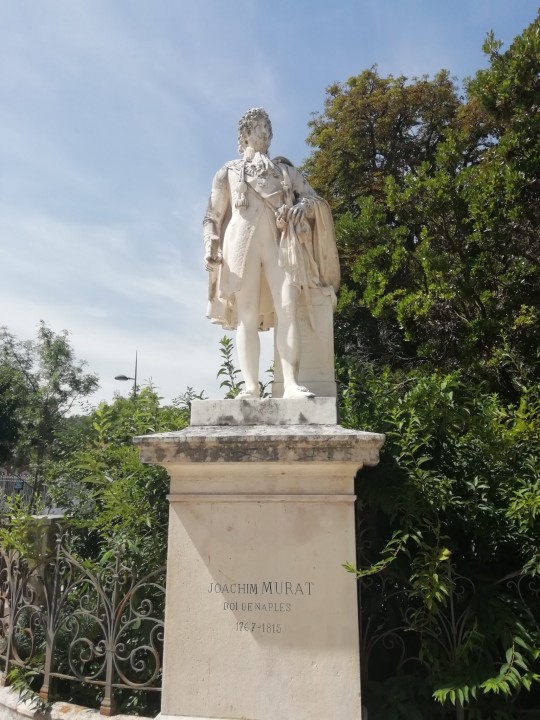
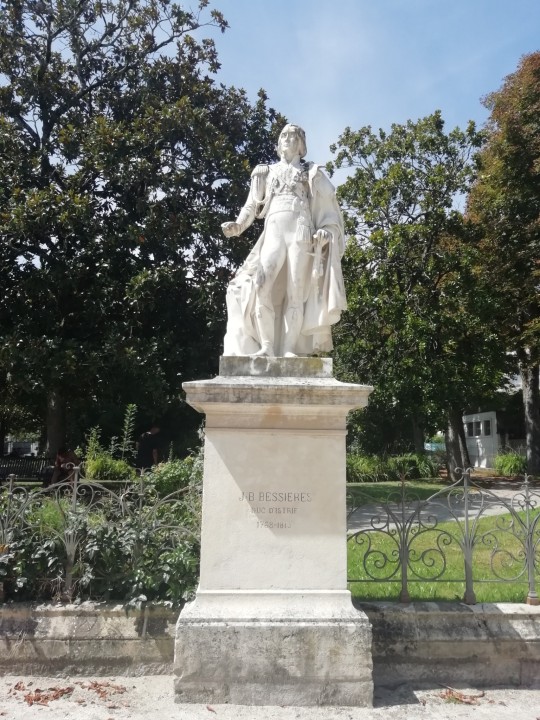



49 notes
·
View notes
Text
@joachimnapoleon replied to your post “For the purposes of suggestions, I do consider...”:
Would love to see you do something with Fouché, as there is not nearly enough fanart of my favorite devious snakeman and his endless trolling of Napoleon.
I feel like all the Fouche anecdotes slipped through my mind like a sieve. Is this how he got away with things? xD

89 notes
·
View notes
Text
Congratulations! That’s fantastic, you are perfect for the program.
Got some good news a little bit ago—I’ve been accepted into a military history Master’s Degree program! It’s been quite a while since I obtained my BA but I’m really excited about taking this next step and furthering my education. If I can get the funding side of things worked out, I should be starting my courses next month.
64 notes
·
View notes
Text
Review of Napoleon (2023)
So I saw Napoleon (2023).
eyes glaze over
collapses and melts into a puddle
This is possibly the most soporifically boring, relentlessly mediocre so-called "epic" I have had the misfortune to see.
Plotless, pointless, and devoid of anything approaching characterization, the movie can be best described as reenacted scenes from a wikipedia article about Napoleon as written by the Anti-Jacobin.
The whole thing is suffused with British reactionary propaganda circa 1815. The characterizations are all courtesy of the Anti-Jacobin and Rowlandson’s cartoons. Robespierre is a tyrant, Napoleon is a buffoonish loutish thug, and Josephine is a slut. There’s nothing there. There’s no character arcs, no development. Sure, it’s pretty enough, but it's boring. So, so, so boring.
While watching it, I was frequently in a fugue state, floating over my body, wondering, "what is a movie? is this what they're like now? with no drama, no characters, no arcs, no interest?"
In fact, I didn't watch it: I endured it.
Joaquin Phoenix is awful. He is completely miscast on every conceivable level. Mumbling, monotone, and charmless-- I never for one moment thought I was watching Napoleon-- it only felt like Phoenix's cosplay. He and Vanessa Kirby have so little chemistry they might as well be appearing in different movies. They supposedly have this grand obsession/love story, but this amounts to sitting in the same room staring off in boredom. There's the occasional ridiculous sex scene which is always doggie style with clothes on. But for the most part, Josephine just stands in the rain or stares off into the mist.
Oh yeah there's the occasional battle. Eh…
Napoleon’s life was filled with colorful characters like the foppish, extravagant and brave Murat, the bold and foul-mouthed Lannes, the scheming, irrepressible Fouche, and the bubbly nymphomaniac Pauline, none of whom are here, and you have a bunch of interchangeable extras standing around rooms or battlefields. The only character who makes any impression whatsoever is Edouard Philipponnat as Czar Alexander, and I would have rather had a movie starring this actor. Alas, that's not what we got.
A lot of money was spent on this movie. A lot of choices were made. The result was a bland, forgettable dud that immediately fell into a memory hole as soon I departed the theatre.
As Napoleon himself would say, BAH!
PS. @microcosme11 and I didn't watch the entire thing, because it is 2 hours and 40 minutes long. As all the restaurants in the neighborhood were closing at 10, we left half an hour early, right before Waterloo and after Josephine died of pneumonia, so we could have burgers and a richly deserved beer.
PPS. Feel free to ask me for specifics!
@thiswaycomessomethingwicked @lordansketil @joachimnapoleon @usergreenpixel @twice-told-tales @josefavomjaaga @bunniesandbeheadings @jefflion
#napoleon movie#ridley scott's napoleon#napoleon film#napoleon 2023#ridley scott#napoleon bonaparte#napoleon#boy what a stinker#I knew it was going to be bad but this was...#like Overdrawn at the Memory Bank bad but with more money thrown at it#but the burgers were really good!
134 notes
·
View notes
Text
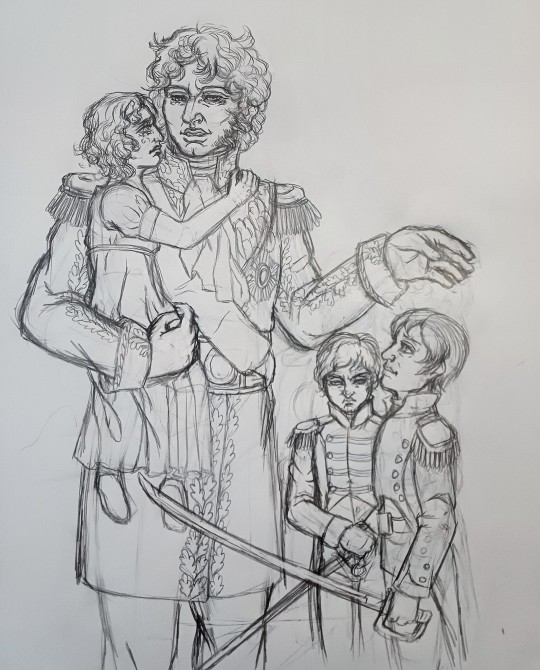
Took a while because i had to redo the sketch multiple times but here is the sketch of the upcoming murat painting. Thanks again @joachimnapoleon! Your excerpts of the Letters really helped a great amount and i hope youre content with this version ^^ the background will be added on the painting later on
#napoleonic era#sketch#napoleonic wars#napoleon#joachim murat#marshal murat#wip#work in progress#art#napoleon's marshals#marshalate
67 notes
·
View notes
Text
I'm glad you're sharing with us and not leaving us!
I wrote a little bit here about how this ship has completely overtaken me and why I find Kazu so interesting. So, here are the first three chapters of my Toranaga/Ishido work-in-progress.
23 notes
·
View notes
Note
Hello sillies! I'm back with more fun facts about Bagration (and also an anti-propaganda for his wife Catherine Bagration)
It makes me very sad to see the two in this confrontation! I love them both very much and I think that in another context they would get along well because they are also curly fellas, but let me tell you something curious, Bagration and Murat got to know each other! In a very curious way, let's say that it was a form of flirtation, a flirtation that was done by Bagration himself, who, the very clever one, praised Murat in a meeting before Austerlitz so that he would accept a false armistice (Murat was also easy to influence. through praise, so Bagration knew how to take advantage of the situation).
Unfortunately, I would like to give more information about what happened between the two, but in my book it only mentions that, that Murat, under the influence of Bagration's flirtation, willingly accepted the armistice (did you know that, @joachimnapoleon ? Hehehe)
These are details that I said in my previous blurb, he is also with Lannes, who days ago I found his book written by Margaret that gave me more details of their meeting. Jean was not in a good mood because he did not like being under Murat's command because he considered him mediocre and when the Russian officers were invited to the barracks for dinner, Lannes chose, of all people, Bagration to form a conversation with him and Jean's opinion of Bagration was that he was someone who was an expert at what he did, not like some buffoonish soldiers present.
(Bagration was terrible at speaking and understanding French! I wonder what language they communicated in)
Here i left you a fragment extracted from both topics:
“Prince Bagration was a most agreeable man; he knew so well how to flatter Murat that the latter, taken in in his turn by the Russian general, eagerly accepted the armistice in spite of remarks of Lannes, who wished to fight.” The armistice was concluded on conditions that the Russians would leave Austrian territory, while the French would remain in Moravia. Both sides agreed to give four-hour notice before resuming hostilities. The armistice was to sent to Napoleon and Kutuzov for ratification. In the meantime, the French invited the Russian officers to their headquarters for a dinner. Bagration met Marshal Lannes there and the two spoke for some time. Lannes told him, if he had been commanding the troops, they would have been fighting by now." —The Lion of the Russian army, Alexander Mikaberidze.
«Bagration's rear-guard was not the only weapon in Kutuzov's arsenal. He decided to rum the armistice mse against its original perpetrators. While Bagration's men dug in at Schongrabern, Kutuzov sent General Ferdinand Wintzingerode under a flag of tmce to meet with the French advance-guard. The Austrian told Murat that because negotiations were underway in Vienna, they should both hold their present positions. If the negotiations failed, he added, then whoever broke the tmce would give a six-hour warning before resuming hostilities. Murat agreed, mostly because he mistook Bagration's rear-guard for the leading elements of Kutuzov's main force and knew he and Lannes needed reinforcements before they could engage the Russians. He sent an aide-de-camp to notify Napoleon of the cease-fire and invited Wintzingerode, Bagration, and other Russian officers to his headquarters for wine and polite conversation.
Lannes never believed Wintzingerode for a minute. Instead, he had a pretty good idea where Kutuzov was, thought Bagration was on his own, and knew Napoleon meant to fight the Russians, not negotiate with them. Already annoyed that his corps was at half strength and Murat was still telling him what to do, he stood on the edge of the gathering, holding a glass of wine and glaring at friends and enemies alike. He spoke only to Bagration, whom he recognized as a professional soldier, not a buffoon like some in the present company. "If I was on my own and didn't have to put up with Murat's orders," he told the Russian general, "we'd be fighting, not standing around drinking and talking about the goddamned weather." Bagration probably agreed with him.41 While Kutuzov marched farther away, Bagration returned to Schongrabern.
Napoleon sent an aide to Murat with another blistering reprimand. "It is impossible for me to find words to express my displeasure with you," he wrote.
"Break that truce immediately and attack the enemy. . . . The Austrians allowed themselves to be fooled over the Vienna bridge, but you have been fooled by one of [Alexander I's] aides-de-camp!" A chastened Murat gave orders for an offensive while Lannes, enjoying Murat's humiliation, rode off to tell Bagration they would be fighting after all.» —The emperor's friend: Jean Lannes, Margaret Scott.
Very curious and charming, right? Now let's move on to different points!
★ I know that there is a certain image of Alexander I and people love him, for my part I hate him because he was unfair to Bagration, Alex never trusted and liked the presence of Prince Georgian, he even excluded him from certain inaugurations and it is said that when Catherine, Bagration's wife, had an illegitimate daughter, Alex forced Bagration to acknowledge paternity and perhaps take financial responsibility for her, but there are no details of the latter. The truth is that Alex was visibly hostile to Bagration and Bagration knew it, he knew that the emperor did not want him and he even fantasized about commanding both Russian armies, but due to his strategic lack and tense relationship with Alex, he clearly never achieved it.
"Although Bagration's secret ambition was to command the Russian armies, he was hesitant to go that far. The proud descendant of the Bagration kings, he was a worthy man, too high and noble a figure to condescend to open intrigue and deliberate insubordination.
Bagration rejected all appeals to write to the tsar. He wrote to Yermolov: "I will not write to the tsar asking for command, because this would be attributed to my ambition and vanity, not to my merits and abilities." Perhaps Bagration realized that Alexander would never give him supreme command of the Russian Army. He was well aware of Alexander's feelings towards him, especially in light of his conflict during the 1809 campaign in the Danube Valley, current disagreements over strategy, and his previous relationship with Alexander's sister Catherine. However, Bagration still hoped to be appointed commander-in-chief and often commented in letters to Rostopchin: "if I commanded both armies..."
I really hate Alexander's attitude towards Pyotr because Pyotr never did anything bad to him, he was very good to him and obeyed him. When Pavel "adopted" Pyotr as a trusted general, that also meant that Bagration became closer to the imperial family and on one occasion, in the Palace, a prince along with Alexander saw Bagration approaching, to which the prince says that " Here comes the best general!" or something like that, but Pyotr responds that flattery/attention is more important "I am not worthy of praise, but the sun/star of Russia" referring and pointing to the tsarevich himself, Alexander.
★ This is related to the previous (anti-propaganda and Alexander) and pay attention to what I say, Bagration's wife started this whole nightmare because she was a very beautiful countess, yes, but as a person she was terrible, she was capricious and cruel (I understand that when she found out about Bagration's death, she had no mixed feelings, she simply didn't care about the death of the man she manipulated so much).
And since she was capricious, she was also a flirt, she fell in love with men to satisfy her ego and then abandoned them, the most notable victim of her was Bagration.
She began to pursue him, to attract him with her charms, but since Bagration did not know how to act in the face of coquetry and was very shy with female affection, he was stoic and she even complained to him about it, some time later Pyotr "falls in love" with her. Catherine (I think he was not in love, he was simply attracted by the enormous beauty of the countess to the point of being a toy for her, because I had read in a fragment that he sometimes wanted to burn the mini portrait that he had of her, but when he saw her beauty, his hand retreated and he found himself unable to do so, besides there was no reason to fall in love with someone like Catherine, in this era marriages were a horrible failure!) and when she saw his success, she immediately left him and things could have ended like this, with Bagration "in love" and her with her wasteful life, Pyotr would never have suffered, but here comes Pavel and his unfortunate habit of marrying two people, I know an anecdote that a marriage did not end well thanks to him, and Catherine and Pyotr are another example.
One day, the two are told to go somewhere, dressed formally for something they didn't know about. When they arrived they were going to be consecrated in marriage, I can already imagine the surprise on both their faces.
The wedding was without consent and the family was close to the emperor, but you know, Pavel had a difficult and severe temperament, so telling him anything about it would end very badly.
It was already known that the Union was going to be unhappy, Pyotr tried to win Catherine's affection by satisfying her whims but this never happened and she looked for any excuse to avoid it, so it was a horrible suffering for Pyotr.
Everything was like that, until the Napoleonic wars broke out and she took the opportunity to go to Vienna, they never met again.
She was traveling through Europe, she was known as "the wandering princess" because she had her own carriage for several trips and she explained to Bagration that she could not return to Russia because "I am sick and I need medication." This lie was quite obvious and he The only thing she did was waste money, and when she began to run out of it, she began to ask Bagration, also in a guilty way, that Pyotr should take care of it because it was his duty as her husband (he also said so). ).
And since Bagration loved her very much and was detached with money, he took care of her and sent her all the money she needed, while she was unfaithful with the whore Metternich (excuse the word, but this man also slept with the wife of Murat, so here is another similarity between Murat and Bagration) and from there they had a daughter whom Bagration had to recognize as his own. I repeat, he never met the girl.
Obviously there are gossips everywhere, so the news of Catherine dishonoring Bagration spread like an epidemic, but despite that, he always defended her first and foremost because it was his duty as a husband, he was really too good for her.
Due to his wife's infidelities, his aristocratic position due to being of noble lineage (he was a prince, but a prince of nothing because his family was exiled, so that title was for decoration) and his poor education due to his youthful poverty, Pyotr's life was the object of gossip, ridicule and humiliation that he had to endure. I remember that he had tense relations with the St. Petersburg Court (he had courtier skills but he did not like the Court that much, from what I read in a book of his written by Gribanov) and there were two options there, speak wonders of Bagration or speak miseries of him.
To be specific in a humiliation towards Bagration, it happened when he once publicly announced with another man that he would take care of Catherine's assets while Pyotr would not, which earned him humiliation.
It also happens that Catherine's family hated Bagration because he "ruined" their daughter's life and he was trying to get closer to them but it wasn't working. On one occasion he gave a gift to his mother-in-law in Naples and she abruptly rejected it.
Bagration was faithful to him until Catherine arrived, the tsar's sister who felt great love for him and used to deify him, so they had a special approach both physically and in letters, they walked hand in hand through the parks and Catherine was younger. than him, but she was a very cunning woman, in a source I had read that during the Court balls, she flirted with Bagration saying that she would love to be queen of Georgia, which makes me sad because they didn't end up together.
The imperial family did not agree with that, partly because he was "ugly" (that same portrait you are seeing in the voting publication was from 1812, when Bagration was 47 years old, and he does not look like it!) and also because of Alex's dislike towards Pyotr, so they were immediately separated, Alex sent Bagration elsewhere while Catherine entered into a marriage.
What do you want me to tell you more? Oh, true! Alexander also had an affair with Catherine Bagration, what do you think?
★ Bagration was modest in the way he dressed and wore the same uniform almost all the time, but still he was like a fashion icon because of the popularity of him! Here is a fragment that explains it better.
While in St. Petersburg, Bagration became a symbol of Russian victory for the younger generation. Young women wore Bagration-style hats while young officers idolized him. Paul Grabbe, one of these officers, recalled that “Bagration's heroic deeds at Amstetten [and Schongrabern] were discussed in our spare time and remained the best reminiscences of that period.” Another contemporary, Denis Davidov wrote: “Bagration's soul echoed the bold thoughts of the younger generation, who always thirsted for military adventures and glory.” In late February, the St. Petersburg Vedomosti Decree published Emperor Alexander's decree praising Bagration for “remarkable courage and presence of mind… resisting the attacks of the superior enemy and marching his troops in order from the battlefield to Austerlitz and then covering the withdrawal of the army.”
★ When he recently moved to the capital, an aunt of his helped him have an interview with Potemkin and it was faster than expected, so a carriage went to pick up Pyotr but he didn't have the look/clothes to introduce himself , but a butler helped him by giving him his caftan with which he could attend the interview. Some time later, when Bagration was already a recognized general, he met the butler, whom he hugged and thanked him saying "without him, I would not have been who I am!", thus demonstrating that Bagration was a pleasant person.
★ Bagration didn't even know him at home before, but when he started as a general and was promoted (he was the most popular of all at that time), the Flattery and special invitations to him increased more, many people wanted to meet him and here's another fragment because it best describes the situation:
As his fame spread throughout the Empire, Bagration made public appearances with the Emperor and served as a guest of honor at numerous events. In early February 1806, Prince Peter accompanied Alexander to the Academy of Medical Surgery and then attended the opening of the first Russian Therapy Clinic. At the end of February, he traveled to Moscow, where the English Club, one of the Empire's most prestigious societies, hosted a special dinner “in honor of his last brave conduct with the armies.” He exceeded all expectations. The English traveler Ker Porter recalled: “The suites of splendid halls, and the great marble hall in which dinner was served, were furnished with the most implacable magnificence.”178 One reception housed 350 guests; One participant described: “he searched for and bought all the rarest meat, fish, vegetables, wines and fried foods for dinner; Everyone wanted to participate in this reception.”179 at 2:00 p.m. Bagration appeared and “was immediately surrounded by everyone in the room, eager to express his joy at his presence, and congratulations to his country for having been blessed with the preservation of such a man.”
Soon a splendid dinner was served and the emperor and Bagration “marred with the greatest enthusiasm” were toasted. “As long as we have baggage, the enemies will always be at our feet.”183 Ker Porter was perplexed by the fervor of the guests and noted: “I have never seen such a lively society of Russians; and more than once it reminded me of similar gatherings in honor of our glorious friend and hero Sir Sidney Smith.” In addition, a band of garrison singers sang a specially written song praising Prince Bagration. Hall, where he was declared an honorary member of the English Club.186 During the celebration, Sir Ker Porter was introduced to Bagration, who greatly impressed him. He characterized Prince Pyotr as “not only one of the first military heroes, but in his character as a man, an honor to human nature.”
The celebration in honor of Bagration did not end in the English Club. Over the next two weeks, he was invited to several dinners, dances, or other gatherings. On March 19, Prince Khovansky hosted another lavish dinner for Bagration. One of the witnesses wrote: “I cannot describe this event to you because there are no words for it. The dining room was adorned with various trophies and there was a portrait of Bagration in the middle of the main wall. There were bundles of weapons, flags, and other souvenirs beneath the portrait, and several young women, dressed in the color of his uniform and wearing Bagration-style hats, the latest fashion in the city, surrounded him.” When Bagration entered, the band played the music and the ladies' song the dedications. Then several ladies presented him with a laurel wreath and led him to a curtain-covered wall. While the curtains were drawn, “a theatrical stage was built depicting a forest and an ancient temple of glory with a statue of Suvorov. [Suddenly], a guardian angel [genius] came out of the temple and gave letters to Bagration, who read them aloud and placed a laurel wreath at the feet of the statue of Suvorov. "Then we started the dance."
★ just as Alexander has a nickname which is Sasha, Bagration clearly had too, and that was Petya, very cute indeed.
★ Bagration was easy to embarrass/blush! I'm just reading his historical novel in Russian and on several occasions Bagration blushes and gets embarrassed, imagine if you were flirting with him, he'd be more ahhh cutie patootie. 😭
★ he was not interested in politics, but if he did get involved in Georgian politics, again, I will leave another fragment to explain it better:
In the summer of 1806, Bagration also participated in Georgian politics. The Georgian nobility was dissatisfied with the Russian administration and anti-Russian sentiment spread rapidly among the population. The Russians introduced the Russian legislature and language which were rejected by the Georgians. The harsh Russian occupation had greatly changed the attitude of a people, who once welcomed the Russians as liberators from the Persians and Turks. Considered by their new masters as mere serfs, the Georgian peasantry looked back with nostalgia on the bad old days. The nobility also felt neglected. Under the Georgian kings, they enjoyed privileges and power, ruling according to their traditions and customs. Now they found themselves living in a province of the vast empire, whose rules were foreign to them and seemed to lack sympathy for their nation. In the spring of 1806, the Georgian nobility asked for help from Peter Bagration, who was one of the most influential Georgians in the Russian Empire. Instead, Prince Pyotr sent his brother Roman to Georgia with letters to the Georgian nobles urging them to comply with the Russian government. However, the Russian administration became alarmed by Bagration's involvement in Georgian affairs and made reports of disapproval to St. Petersburg.
★ That's right, Bagration had a sense of humor, he even told jokes in tense/dangerous moments before a battle.
★ there is a mischaracterization of Bagration in the novel War and Peace by Leo Tolstoy, he is represented as someone stoic, flat, inexpressive, things like that, but Bagration was very warm, pleasant and sociable with people, typical of expressive people, with Just saying that he blushed easily is enough!
★ Bagration was so sociable and the typical extrovert who adopts an introvert to such a degree that he was a close friend of Arakcheyev, a man with a horrible temperament (like killing kittens and being in favor of corporal punishment, according to what a friend who knows him told me well) that he received disdain and his friendships were almost non-existent, but with Bagration it was different, from what I read in the few letters from Petya to Arakcheyev, he handled both professional and personal things, and one of them is that Bagration was aware of the criticism towards him and told Arakcheyev that it hurt his soul to receive such criticism.
★ As he had said, Bagration was close to Emperor Pavel, who was approaching his peak of paranoid and found it difficult to trust anyone, so he "adopted" Bagration as his trusted general since he was a first-timer at the site and did not He knew nothing about the Court, which gave him an advantage. Pavel appreciated him and got along very well with Pyotr, even recommending him for promotion and Arakcheyev too since he was very devoted to Pavel and all that. I'm going to go to the old reliable, fragments hehehe
Suvorov was already on his way to St. Petersburg, when unexpected news devastated him. Although Paul praised Suvorov and arranged a reception for him, he still regarded him with suspicion and resentment. He knew that Suvorov's return to Russia meant that the field marshal would continue to oppose the new military system established by Paul. The emperor could not allow this to happen. They told him that Suvorov had violated his rules and appointed the generals of the time, 4 and banned the Prussian pigtails, reintroduced by Paul into the army.5 The emperor canceled the reception and sent a brusque letter to Suvorov. “I have learned that while you were in command of my forces abroad you had on your staff a general, known as an orderly, despite my instructions…. Surprised by this, I order you to tell me what prompted you to do it.” 6 Furthermore, Paul forbade Suvorov to come to St. Petersburg during the day;
It was said that he even wanted to deprive the field marshal of his title of “Italiiskii”. The old field marshal was shocked by this misfortune. He was already in poor health and this humiliation further sapped his strength. He arrived in St. Petersburg late at night, unannounced and unwelcome. An imperial courier informed him that he was forbidden to visit the imperial palace.7 Peter Bagration was one of the few who visited the disgraced Suvorov during his illness. On one occasion, several days before Suvorov's death, Paul sent Bagration to inquire after his health.8 Prince Peter described finding [Suvorov] very weak...he fell into a coma. His assistants rubbed spirits on his temples and gave him smelling salts, which brought him back to his senses. He looked at me, but the old fire no longer burned in his eyes.
He continued to look at me as if trying to recognize me and then shouted, “Ah! It's you, Peter. It's good to see you!" He remained silent and then looked at me again and I informed him of my errand from the Emperor. Alexander Vasilievich came to life, but his speech was broken. “Convey my respects… my deepest respects… to the Emperor …please do it…Peter…Ah…so much pain!” He said no more and fell into a delirium.”9 Death was rapidly approaching and, on May 18, 1800, Suvorov whispered his last words. Large crowds followed Suvorov's remains during the funeral. It seemed that the entire population of Suvorov was present. However, Pablo pursued Suvorov even to death. At his insistence, the funeral date was moved one day later; newspapers were not allowed to publish obituaries and the military honors awarded to Suvorov were listed one rank lower. of his rank.10 The emperor did not attend the funeral of his best commander and instead reviewed the Guard regiments.11 Suvorov's death was an important date in Bagration's career. command of Suvorov and rose to his rank and positions thanks to the support of the field marshal.12 Upon returning to St. Petersburg, Bagration became famous and accepted in higher social circles. He was often invited to the palace and met with members of the. Royal family. On one occasion, he was introduced to the future Emperor Alexander and a group of aristocrats. One of them, Prince Eugene of Wuttemberg, greeted him: “Here comes the famous Prince Bagration.” Prince Peter shrewdly replied to the courtier: “My Prince, if you want to see someone distinguished, here is the rising sun of Russia” and pointed to Alexander. (here is what I said a few moments ago, but better)
However, Bagration was also in a dangerous position. His close relationship with Suvorov, whom Paul hated so much, could have led to his disgrace. However, cordial relations existed between the emperor and the young general. Paul met Bagration on many occasions and contacted the sick Suvorov through him. In addition, Bagration had no connections with the court and did not participate in judicial machinations. Paul was already suspicious of the conspiracy against him and with each passing day he became more and more cautious. He needed trustworthy people around him, so he focused on Bagration.
Prince Peter was new at court. He had spent most of his life on the periphery of the empire and had visited St. Petersburg only once in 1782, when he joined the service. For the next eighteen years he fought in the Caucasus, Crimea, Poland, Italy and Switzerland and was unable to travel to the capital. He was not familiar with the imperial court and did not participate in various intrigues. In addition, the emperor was well aware of Bagration's military achievements. Suvorov had periodically reported on Bagration's successes at Brescia, Tidone, Trebbia and Novi. The Swiss campaign brought him new laurels, so Paul appreciated his talent. On March 20, 1800, he was appointed commander of the 6th Jager Regiment, and in April, Paul gave him a large estate in Lithuania to replace the one Bagration received for his actions in Trebbia.14 However, Bagration was not frugal. .
To lead a life befitting his status, he began an extravagant lifestyle in the capital that naturally resulted in increasing debts. Over the years, Bagration sold two properties to cover debts.
With the onset of spring, Bagration was ordered to Pavlovsk, where his Jagers protected the imperial family.15 In May, Bagration attended the launching ceremony of three new ships at the Admiralty. Then, in June, Bagration accompanied the emperor to Peterhof in St. Petersburg, where he attended naval maneuvers and enjoyed the social life of the court. In July 1800, Paul again rewarded young Bagration and appointed him chef of the Jager Lifeguard Battalion.16 This appointment indicated the great respect Paul had for Bagration. The position of chef of the lifeguard regiments was usually filled by the emperor and members of his family.17 Paul created the Prussian-style chefs in August 1798 and this position practically replaced the commanders. The chefs were all-powerful within the regiment, supervising the management of the troops, their training and determining logistical needs.
Unlike other chefs, Peter Bagration was also appointed commander of the Jager Lifeguard Battalion and thus combined both positions.18 However, considering Paul's meticulous attention to the Prussian military organization, this appointment could also compromise Bagration. . Paul held daily parades and reviews in the capital and any poor performance by officers led to disgrace and banishment. 19 In June 1800, Paul reviewed Bagration's battalion on Semeyonovsky Square in the capital. Prince Peter deployed his battalion into three companies of 100 men each and his orderly formation and neat appearance pleased the emperor. Paul asked Bagration to show him several Jagers that he found in perfect order. In 1800 Bagration's life soon became routine. Every morning he attended the Wachtparade, which Paul modeled after the daily exercises of Frederick the Great. Paul personally supervised the deployment of troops and anxiously watched the parade for any imperfections. After the parade was over, Bagration led the troops to the barracks and continued the exercise there. The emperor often made unannounced visits and Prince Peter had to be ready at any time.
At the end of July 1800, Paul moved to Tsarskoe Selo. Bagration with his battalion was in charge of security there. He stayed in the town of Sofia, which the Empress Catherine founded for her entourage. However, Paul did not like staying in Tsarskoe Selo, which reminded him of his mother, so he spent the rest of the summer and early autumn of 1800 in Gatchina, where Bagration continued to protect the imperial family. Paul often ordered Prince Peter to prepare his battalion for maneuvers and exercises.
In one of them, in September 1800, Paul gathered forces from all branches of the army to reenact the battle. The troops were divided into two opposing corps and Bagration “fought” under the command of General Mikhail Kutuzov, who won the battle and earned Paul's praise. Kutuzov, who was later appointed military governor of the capital, had a high opinion of Bagration. In September 1800, when Major General Ivan Ivelich accused Bagration of embezzling regiment funds, Kutuzov personally investigated the matter and determined that Bagration committed no crime.
★ He had a mini portrait of Alexander's wife (she was good to him, as I remember), Catherine (Alexander's sister), Catherine Bagration (his wife) and Suvorov, who was like a father figure to he. There was someone else but I don't remember well.
★ On one occasion he fell from his horse and suffered a concussion that was not serious, but that meant that he had to leave his position to recover, which happened, but he was replaced by a man not so nice and very different from him , that at the time this man announced that he would replace Bagration, he did so arrogantly and praising his own achievements, earning the contempt of the soldiers who preferred Bagration, who had given a very emotional and sweet farewell speech that even Langeron praised the speech.
Here's another extract from the topic:
Bagration then praised his generals and officers for their services in this campaign, concluding: As I leave this army, I consider it my sacred responsibility to express my deep gratitude and respect to the commanders of the corps, detachments, senior and junior officers, as well as the rank and archive, who, serving under my command, had to fulfill his duties for the Emperor and the Fatherland, and trusted me unconditionally in doing so…. I want to thank my generals and the entire army for the love they always showed me and that I enjoyed every moment of the campaign, in the middle of battle or in March. This love will forever be imprinted on my heart and I will always remember it as the greatest and sweetest reward that will comfort me for the rest of my life. I will pray to the Lord to bless my comrades in arms and help them in all their endeavors. I began my command of this army with victories and with victories I say goodbye to you.”154 The army was moved by these words. Langeron declared that “Bagration's farewell order was one of the most moving and well-written speeches he had ever read in Russia. He was very successful in reaching the hearts of the troops, while Kamensky's order only generated discontent among the rank and file.
★ now some descriptions about Bagration:
• In the spring of 1802, Bagration planned to travel to Naples, but was unable to due to financial strain. Denis Davidov recalled: “[Bagration] liked to live luxuriously, he always had a lot of everything, but not for himself, for others. He was satisfied with some necessary things and was always sober. I never saw him drinking vodka or wine, except for two small glasses of Madeira at lunch.”40 However, Catherine Bagration's extravagant spending was out of control and the family's debts increased. Furthermore, Bagration liked his troops and often spent his own money on them. As the chef of the lifeguard battalion, he had to live lavishly to maintain the status of himself and his acquaintances. His new acquaintances in high society only helped him to spend lavishly. A contemporary noted: “The extravagance of his friends…let him forget moderation.”41 His annual salary was an impressive 2,200 rubles, but his debts slowly accumulated. Bagration had to sell his estate and other property that he received from the government to pay the debtors. In early 1802, the state treasurer informed Emperor Alexander that Bagration had to sell his estate to the treasury. “[Bagration] did not determine any price, but he informed me that he had 28,000 rubles in debt to the Treasury, plus another 52,000 rubles in debts, for a total of 80,000 rubles.” In February 1802, Alexander gave his consent for the Treasury to purchase Bagration's.
In general, the Russian army was in better condition than Napoleon's troops. The artillery not only had numerical superiority over the French (640 to 587), but also the advantage in Caliber. Bagration spent September 6 resting his troops and preparing for battle. He demonstrated deep concern for his troops. General Mayevsky recalled: “The next day [after Shevardino] I was asleep in the courtyard. The prince [Bagration], passing me with his retinue, moved as silently and silently as we usually do while approaching the room of a sleeping loved one. Such attention to his troops… only strengthened his sense of loyalty to this commander.”
•Langeron also noted Bagration’s “invaluable talent, as he was admired [obozhaem] by all who served under him. His remarkable but taciturn bravery, his manners, easy conversation, familiarity with the soldiers, sincere joy animated troops and fueled universal admiration [for him]. No other commander of our armies was loved as much as [Bagracion]; Even the generals, whom he outpromoted, served with pleasure under him.” Langeron highlighted Bagration's achievements by referring to his humble beginnings. He observed: “I saw him in St. Petersburg in 1790 dressed in the uniform of a common Cossack, unknown to many and without invitation to any salon.” However, almost two decades later, “[Bagration] was commanding an army!” Furthermore, Langeron stated: “Russia has no better commander of the Advanced Guard, or of the main forces [Glavnikh Sil] than Bagration.”
••The soldiers loved him and believed in his invincibility. But now he was wounded and with him, “the soul [of valor] had departed from the entire left wing.” When he let himself be carried away, his aide-de-camp, Adrianov, ran to the stretcher and said: “Your Excellency, they are taking him away, I am no longer useful to you!” Then, as Witnesses recalled: “Adrianov, in the sight of thousands, moved like an arrow, broke through the blows of the enemies and fell dead.” Total confusion. ”97 General Mayevsky recalled: “The Prince [Bagration] was taken behind the line and his entourage accompanied him. The fight was now fought in such confusion that I did not know who and how I should join.” (It happened in Borodino)
And that's all for today! I know that many love Murat, it is difficult not to get attached to a tremendously beautiful and loving man, but I would like you to please vote for Bagration, his life was not as beautiful as Murat's and it is not unusual for someone to call him ugly when you and I know it's the complete opposite, so I would really appreciate it if you voted for Bagration, I'm going crazy 😭.
Thank you for reading, silly!
(I'm supporting you, @yaggy031910 hehehe)
.
45 notes
·
View notes
Text

A Murat poster I finished last week. This went through a lot of revisions though I am satisfied with how it turned out. I also don't work with green that much so I took the opportunity to use the color green.
The quote in the center was taken from one of @joachimnapoleon 's post on her website.
#napoleonic era#napoleonic wars#joachim murat#napoleon's mashals#my art#poster design#french history#napoleon bonaparte
46 notes
·
View notes
Text
Index: posts related to Duroc
(Includes interesting links and reblogs from people much better informed than me!)
Duroc in correspondence
Eugène to Hortense, 7 June 1800 (about Duroc almost drowning)
Duroc to Davout, April 1804 (reblog from handfuloftime)
Duroc to Eugène, 1st January 1806
Duroc to Eugène, 16 August 1805 (brief quote about Bessières)
Duroc to Murat, 29 October 1806
Duroc to Eugène, 17 - 21 July 1808
Duroc to Murat, 15 February 1809
Duroc to Eugène, 26 April 1809 (about Eugène losing the battle of Sacile)
Parallel letters from Vienna, 27 and 28 July 1809 (Bessières and Eugène have dinner with Duroc)
Duroc to Lebrun, 4 April 1811
Duroc to two ladies, from Moscow 1812
Duroc as diplomat and in the army:
Rousing sleepy colleagues (from Eugène's memoirs in Egypt)
Premier aide de camp?
Duroc in Berlin
Duroc in Berlin again (1803, reblog from handfuloftime, de Ségur's memoirs)
Duroc trying to appease Caulaincourt at the beginning of the Russian campaign (reblog from handfuloftime)
Duroc during the Russian campaign (reblog from northernmariette)
Duroc's role at Napoleon's court:
Duroc as Hortense's suitor (from Hortense's memoirs)
Description of Duroc (reblog from bougredane, Laure's memoirs)
Description of Duroc (reblog from joachimnapoleon, Rapp's memoirs)
Description of Duroc (reblog from handfuloftime, Marmont's memoirs)
Description of Duroc (reblog from amitie-de-napoleon, Caulaincourt's memoirs)
Duroc's friendship with Eugène
Emilie Bigottini, Duroc's mistress (reblog from handfuloftime)
Duroc softening the blow
Duroc relationship with Caulaincourt (reblog from handfuloftime)
A Prussian at Napoleon's court (1804)
Duroc as Napoleon's "gatekeeper" (reblog from valinarii)
Sources about Duroc:
Biography
Correspondence
#napoleon's marshals#napoleon's generals#napoleonic era#geraud christophe michel duroc#duroc#masterpost#references
12 notes
·
View notes
Text
@jehadism @on-holidays-by-mistake @saintjustitude @michel-feuilly @pobodleru @jefflion @stalinistqueens @josefavomjaaga @joachimnapoleon @amypihcs @captainknell @maggiec70 @18thcenturythirsttrap
Would you be interested if I opened commissions of sorts? I know I don’t draw but I write poetry, so I can offer poems on specific subjects…
10 notes
·
View notes
Text










36 notes
·
View notes
Text
“We have a note from an anonymous Bremen townsman: "Murat seemed a friend of good cuisine, and after Talleyrand, for whose household many eggs had to be delivered, his table was particularly full.”
Found this interesting bit in a text about french army in Brno, food shortages during the war and about the overall impact of Austerlitz
Something for @joachimnapoleon 😉
#marshal murat#history#napoleonic wars#napoleon bonaparte#napoleon#napoleonic era#joachim murat#talleyrand#brno#austerlitz
32 notes
·
View notes
Text
It continues! 😍 Thank you, thank you, thank you! I was so worried you would abandon it!
It's been a woefully long time since my first two chapters of this story--a lot longer than I even realized until this afternoon when I looked at the date I started it. Apologies to everyone who left me such kind feedback on the beginning. I've been plotting it out further in my head and I think I've got a good direction with it in mind, so I'll try to be better about updating it. If you're still interested, enjoy! :)
Excerpt:
This was a mistake. He began to turn away, hoping his presence had not yet been noticed. “Well, are you coming in or not?” a familiar irritable voice called to him from the now open doorway. Halting in mid-turn, he looked up at Napoleon. It was the first time the two men had seen each other in two and a half years. A long, tense silence fell as they regarded each other. Murat was struck by how much Napoleon had changed since their last meeting. He had gained considerable weight; his hair, though the same color, seemed thinner, his complexion wan. His grayish-blue eyes, however, had not lost even a sliver of their usual intensity. They bored into Murat now, taking him in from head to toe. His expression was completely indiscernible. Murat shifted uncomfortably.
39 notes
·
View notes
Text
Books about Napoleonic era (and Polish history) - 3
Good day, dear all, and let me share with you some books I've read recently.
And because today is the birthday of Tadeusz Kościuszko I'll start with a biography of him The Peasant Prince, by the American historian Alex Storozynski:

2. One more position about the Polish history, in English, I'd like to recommend you is Richard Butterwick's The Polish-Lithuanian Commonwealth, 1733–1795: Light and Flame, dedicated to the reigns of Polish-Lithuanian two last kings, Augustus III Wettin and Stanisław August Poniatowski:
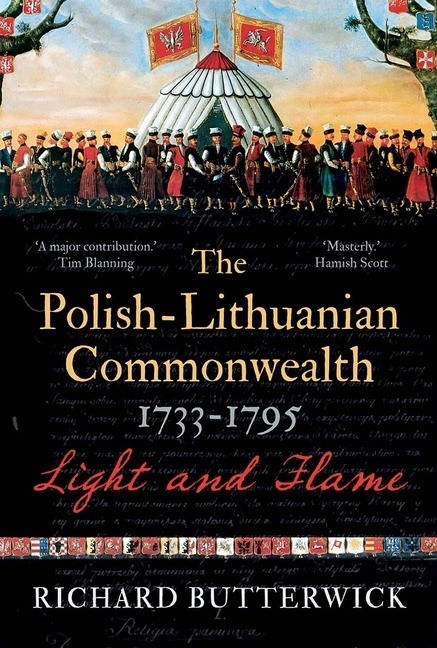
From the topic of Polish history let's switch to the French one.
3. One more addition to my collection of Talleyrand's biographies was this one, written by Robin Harris:

4-5. Then, there were two books about Napoleon's private life, by Octave Aubry and Sigrid-Maria Größing:
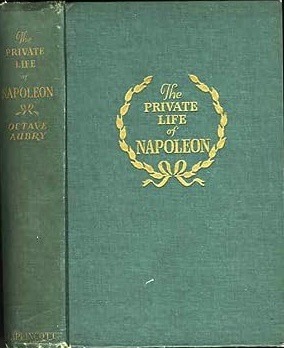

6-7. A study on the topic of French revolutionary and imperial generals, by Georges Six, and George Nafziger's Imperial Bayonets. (These were books with lots of military details, so I can't say I've enjoyed them thoroughly, rather not belonging to their target audience))
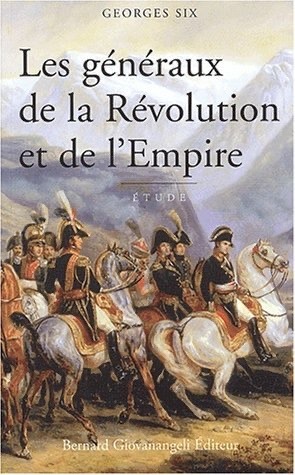

8. And this is a book I really liked, The anatomy of Glory by Henry Lachouque! And though its subtitle (Napoleon and his Guards) kinda states the book will be focused on the Imperial Guards, in fact its topics turned out much more wider, including information on Napoleon himself, France and even some details of the usual life of that times:

9. The book majority of you have already read, The Iron Marshal, a biography of Louis Nicolas Davout by John Gallaher:

10-11. And the last but not the least - two books on Murat. The first is a book by the French historian Jean Tulard and the second is an impressive work of Sarah Hammel @joachimnapoleon.


Thanks a lot, Sarah, for letting as see Joachim Murat through his letters, from his own point of view!
#books#napoleonic era#history books#kościuszko#tadeusz kościuszko#Alex Storozynski#Polish-Lithuanian Commonwealth#Richard Butterwick#Talleyrand#charles maurice de talleyrand périgord#Robin Harris#napoleon#napoleon bonaparte#Octave Aubry#Sigrid-Maria Größing#Georges Six#George Nafziger#Henry Lachouque#Louis Nicolas Davout#John Gallaher#joachim murat#jean tulard#Sarah Hammel
45 notes
·
View notes
Text
Maréchaux d'Empire: La gloire pour destin
Quelle horreur!
On the other hand, this book will keep me alternating between guffaws and serious eye-rolls for days.
The "replacement" for David Chandler's anthology, Napoleon's Marshals, published in 1987 with each of the 26 mini-bios written by for-real scholars [and not just Americans, either] is this November 2023 anthology edited by Francois Houdecek, who holds forth at the Sorbonne, claims to be a "disciple" of Jean Tulard [I believe M. Tulard has thousands of those!], and is involved in all sorts of activities and scribblings involving Naps. He is also responsible for gathering and organizing vast quantities of Napoleon's correspondence, so kudos for that.
However--and oh, my! what a huge "however" this is!--the 26 contributors range from the marginally average Pierre Branda to the apparent dregs of French scholarship whose names have never resonated outside the borders of Gallica. Each of these articles is depressingly cardboard, flimsy with details, utterly bereft of any attempt at analysis or understanding of the individual's character, talents--or lack thereof--and other useful and expected details, even in an anthology. These contributors apparently competed to see who could write the most drivel using the fewest sources. Naturally, I went straight to the entry about Lannes, and by the time I reached the end, I had permanently dislocated my eyebrows. The "author" of this travesty is Jacques-Olivier Boudon, whose credentials, on paper, are impressive but whose knowledge of Jean-Boy is worse than passing; it is non-existent. The reason for that is based on M. Boudon's sources:
He cites Lannes’ “official dossier” in the SHD, which I copied before I left, so I know every page and every sentence in it, and I know you won’t find squat that is useful unless, of course, you care how much putting on Mozart’s Requiem cost, and who sang the tenor solo.
High on the hit parade list is Regis de Crepy’s smarmy bio of the Lovely Louise, another book I can quote endlessly. Boudon used one letter from that.
Boudon also took bits and pieces from the three more recent French biographies by Dammame, Zins, and Willette—although the latest was published in 1994—and explained what I thought about them in a previous blog.
The absolutely most hysterical “source” is the 2002 historical fiction by a lovely 93-year-old woman, Penelope Le Fers-Dupac, who lives in Lectoure and who I know [I also know the biographer Jean-Claude Dammame, but that’s another story]. This novel is called “Le Mousquetaire de Napoleon: L’autre vie du marechal Lannes.” Make of this what you will, but it is the wonderfully entertaining, hilarious, and fictional tale of Jean-Boy’s first marriage.
I am appalled that this person didn’t do justice to Jean-Boy in an anthology where he would have shone at the top in capable hands. I know who's the real expert here, and I certainly don’t mind if someone also chooses to write about My Guy. But he or she had damn well better get it right, and this French morceau de merde massacred his subject.
BTW, joachimnapoleon, have you encountered Vincent Haegele? He did Murat no favors here, either. Thanks for reading the rant. I feel better.
#jean lannes#don't bother#napoleon's marshals#truly terrible french writng#non-history#who are these idiots?
17 notes
·
View notes
Text
So I had an idea where I take a painting and make a poster based on a design trend I recently discovered. This idea gave way to me creating three posters to whom I like to call the "Big Three" of the community: @joachimnapoleon @josefavomjaaga and @maggiec70 who go out of there way and share information about the people they focus on to us, not only through Tumblr but through the books they've published as well. If it weren't for them, I don't think a lot us could get such fascinating information about these men. That is why I'm dedicating these designs to you:
Sarah-
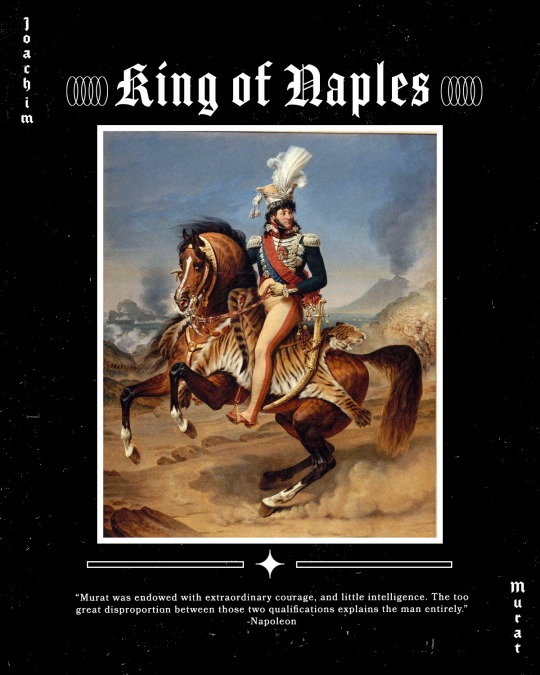
Josefa-
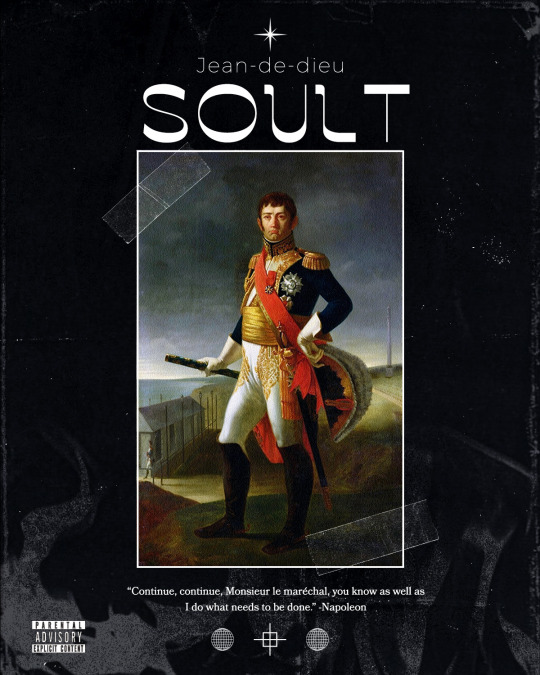
and Margaret-
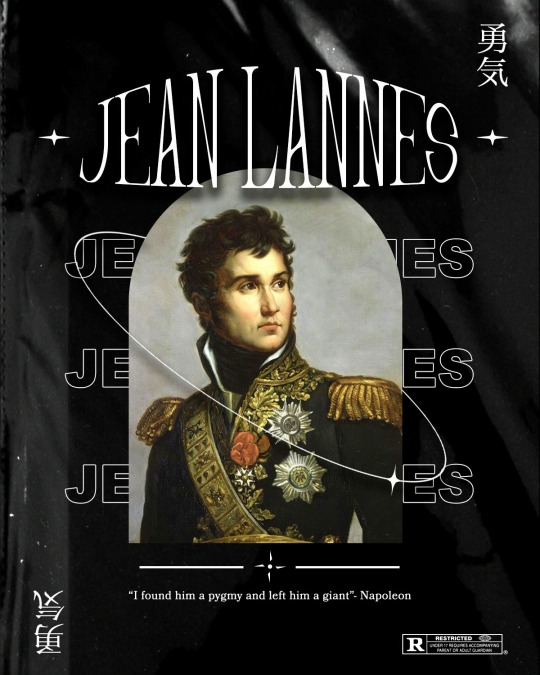
I know this is out of nowhere but I am truly grateful for what you guys do! The quote I used for Murat is from Sarah's collection of quotes from those who knew Murat. Josefa, I also want to thank you for providing me the quote for Soult, I'm grateful for your help! Enough of me talking and I do hope you guys like the posters!
#vector icons were made by design syndrome#napoleonic era#napoleon bonaparte#joachim murat#jean de dieu soult#jean lannes#french history#my art#streetwear design#poster design
60 notes
·
View notes